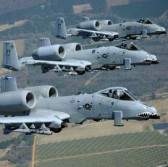 Raytheon has concluded a series of flight tests of a close air support platform with the Defense Advanced Research Projects Agency.
Raytheon has concluded a series of flight tests of a close air support platform with the Defense Advanced Research Projects Agency.
The company demonstrated DARPA’s Persistent Close Air Support system on both A-10C Thunderbolt II and MV-22 Osprey aircraft, Raytheon said Sunday.
Flight tests took place over three phases as part of an 18-month, $25.5 million contract the company received from DARPA in 2014.
PCAS works to help facilitate sharing of situational awareness and weapons systems information among land-based troops, combat aircrews and Joint Terminal Attack Controllers.
The system consists of PCAS-Ground equipment built for JTAC and a PCAS-Air tool that is composed of a pilot tablet and a launcher electronics device.
“The PCAS program was able to reduce close air support response times from nearly one hour to less than six minutes,” said Tom Bussing, vice president of advanced missile systems at Raytheon.
DARPA will work to integrate the PCAS system with other military platforms and has started efforts with the U.S. Army to deploy the platform for drones, manned aircraft and ground troops.
Raytheon serves as the lead systems integrator for the platform in collaboration with Northrop Grumman, BAE Systems, General Electric, Rockwell Collins and 5-D Systems.




